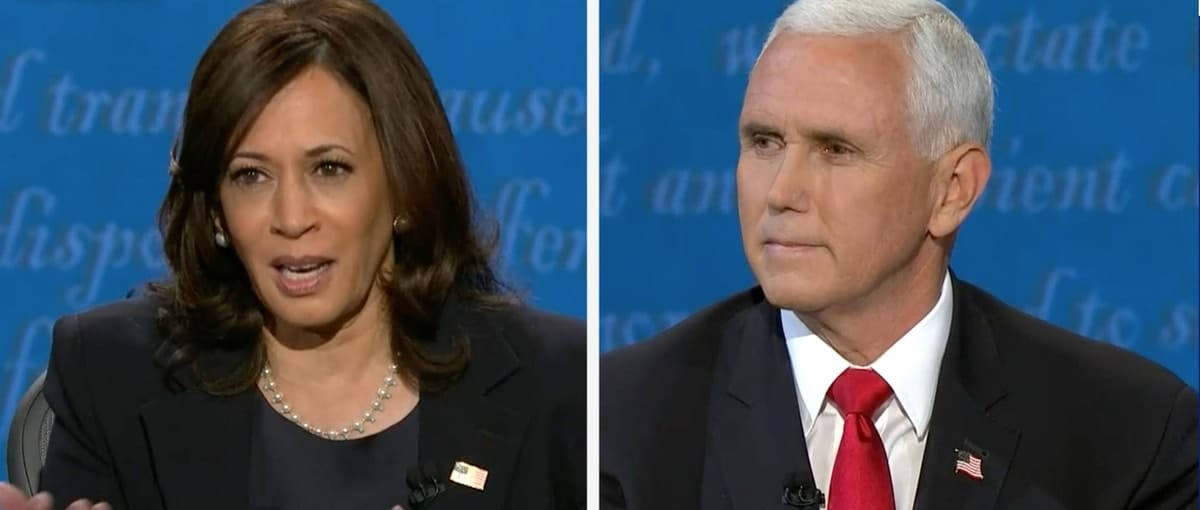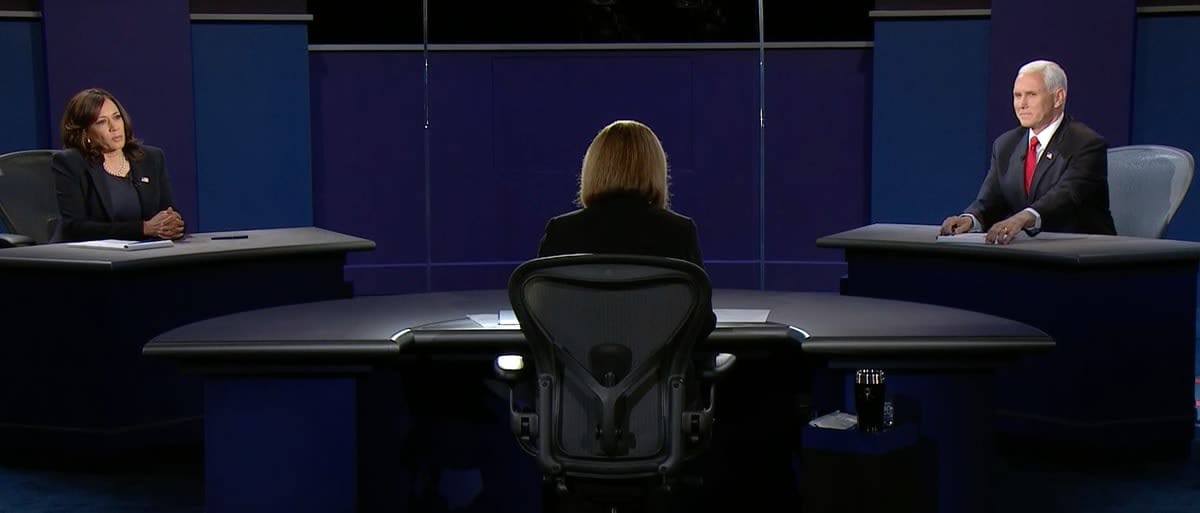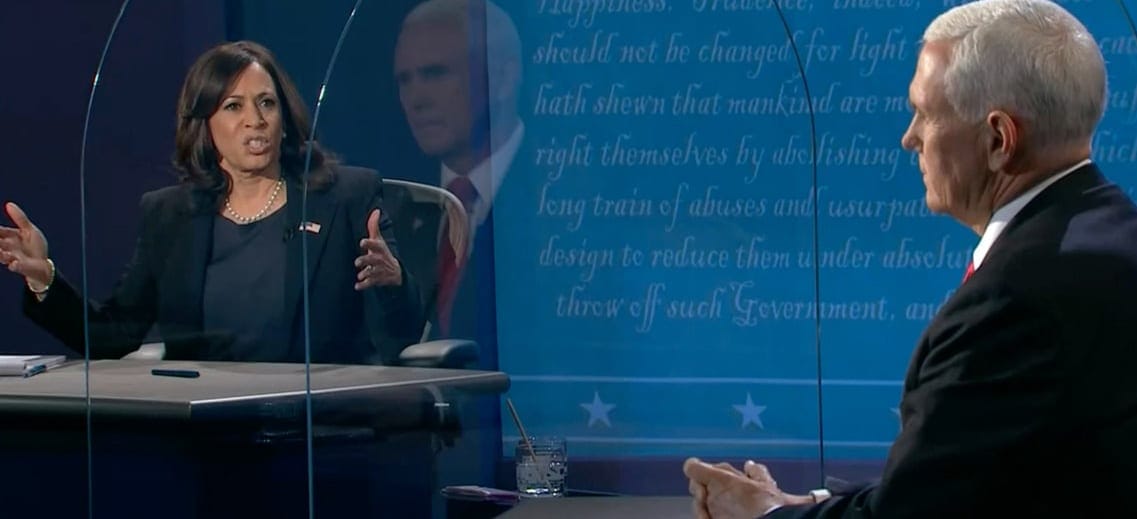
In a chaotic week that saw the COVID-19 pandemic hit home at the White House, the vice- presidential debate, an often underappreciated event on the US presidential election calendar, offered a much-needed moment of calm and clarity.
Unlike the turbulent fireworks display that was last week’s first presidential debate, this one-off meeting between Vice-President Mike Pence and California Senator Kamala Harris was notable for its civility and substance.
Aside from its refreshing tone, the VP debate has managed to capture the attention of an overwhelmed nation that has recently been confronted with the importance of the presidential line of succession.
With President Donald Trump and former VP Joe Biden both in their 70s, the role of the vice- president as the de-facto successor has suddenly come into sharper focus, only further driven by Trump’s positive COVID-19 diagnosis.
An unexpectedly important debate
This VP debate between Pence and Harris was always expected to be a hard-fought but respectful contest. In the aftermath of an almost unwatchable first presidential debate, and a week of uncertainty following the White House becoming a COVID-19 hotspot, however, the stability and coherence of this contest was palpable.
While it had its brief moments of tension and hostility, it was generally a display of professionalism and decorum that’s been largely absent in American politics over the past four years.
The solemnity of the debate reflected its renewed significance in the 2020 election cycle, with voters getting an unfiltered opportunity to view the two VP candidates as potential presidents and leaders of future generations of their parties.
It gave both candidates a chance to promote their respective tickets, as well as a free platform to polish their individual brands in front of millions of viewers.
Read more: 'Give me a break, man': A presidential debate with no winners
For Pence, this was his chance to appeal to a broader cross-section of conservative voters than Trump, while benefiting from the structural backing offered by the Trump campaign and the White House. It gave Harris an opportunity to underline her status as a trailblazing woman of colour on a presidential ticket, while simultaneously – and briefly – reviving memorable elements of her suspended presidential campaign.
So, with the unprecedented nature of the COVID-affected presidential campaign and candidates, it’s important to reflect on the VP candidates’ debate performances less as running mates and more through a lens of future leaders. While a vice-president ascending to the presidency is never the preferred option, it’s at least worth considering the candidates as future presidential candidates who may be seeking to lead their respective parties to victory in 2024 and beyond.

Pence: A classic conservative
As an evangelical Christian from a military family, Pence is one of the last remaining representatives of traditional conservatism in a Trump administration that’s rapidly changing the identity and values of the Republican party and its supporters.
Pence’s conservative ideals were reflected in his debate performance, where he seemed to be stronger on issues relating to the Supreme Court, the economy, and foreign policy, while he stumbled when pressed on climate change and healthcare.
He was able to appeal to Trump’s base and anti-Trump Republican voters alike by pushing back at Harris’ defence of Biden’s record, and what Republicans like to refer to as her “radical left” socialist policies.
Pence represents a more moderate faction of the conservative side of American politics than Trump and, because of this, along with his noticeably calmer presence, he’s much more palatable for future iterations of the Republican party and its voters.
While Pence’s performance was worlds apart from Trump’s in last week’s presidential debate, it wasn’t all smooth sailing. He dodged crucial questions regarding his response to the COVID pandemic as the head of the coronavirus taskforce, and his administration’s efforts to repeal Obamacare. He repeatedly interrupted Harris and the debate moderator. And, like Trump, he had a flexible understanding of facts.
But, unlike Trump, he remained calm and respectful when challenged by Harris, and was able to launch some well-placed attacks of his own. It was a good performance overall, and puts him in much more of a favourable light in the eyes of voters than Trump’s performance did on his first attempt.

Harris: A trailblazing progressive
As a woman of colour from the left wing of politics, Kamala Harris represents a significant portion of the American population. Despite this, she’s still seen as a trailblazing candidate in a country that’s struggled to put women on the presidential ticket.
But her racial background was only one notable aspect of what was a strong overall performance on the debate stage. She was able to draw on her legal experience to prosecute an effective attack on Pence’s role in the Trump administration’s unsatisfactory response to the pandemic, and appeal to voters to unify around their COVID-19 experiences rather than around their parties.
With COVID-19 now firmly back in the spotlight as it tears through the White House, it’ll take more than a 90-minute debate to change the course of the election for more than a day.
But, like Pence, Harris’ performance wasn’t flawless. She missed prime opportunities when they presented themselves to push her points and rebut attacks. She also dodged certain questions, and struggled to maintain her arguments on traditionally conservative issues such as the Supreme Court and trade.
But she held her own against Pence’s attacks on her record, as well as that of Biden’s, without being confined to a solely defensive role, and without compromising the frontrunner status of the Biden campaign in the election race.
An unpredictable final month
So, with the performances of both VP candidates scrutinised, the inevitable question arises – who won, and how does it affect the election with less than a month to go?
The unfortunate answer is that while the debate received markedly more attention due to recent events, and while the candidates turned in strong performances, it may have very little impact on the election outcome.
Neither candidate’s performance could be described as particularly memorable, and with just weeks remaining, every minute spent in front of voters needs to stick in the mind – but not in a way that turns voters off, as was likely the case in last week’s presidential debate.
With COVID-19 now firmly back in the spotlight as it tears through the White House, it’ll take more than a 90-minute debate to change the course of the election for more than a day.





